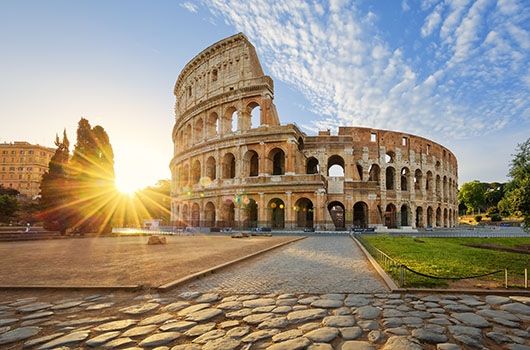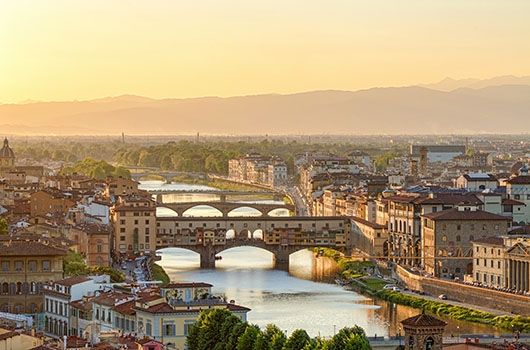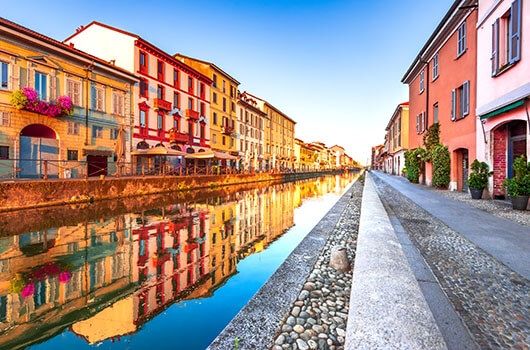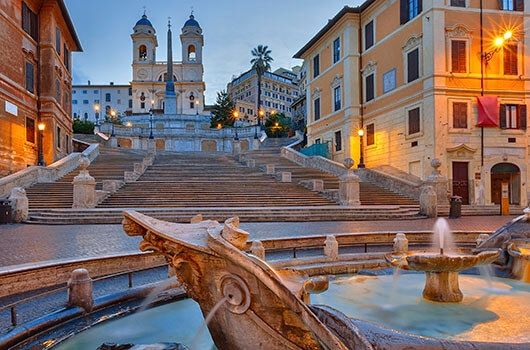Top 3 Best Places to Study Abroad in Italy
If you’re looking for an unforgettable study abroad experience, Italy has got you covered. Cultural experiences. Artistic treasures. Academic excellence. Italy is everything you need and then some.
Your biggest question: Where to study abroad in Italy?
Here we offer key facts about three of the best places to study abroad in Italy. It’s Rome vs. Florence vs. Milan. Check it out.
Key Facts About Rome
When you study abroad in Rome, you’ll walk the footsteps of ancient emperors and marvel at the Colosseum. From the Vatican City to the Pantheon, Rome is a living museum that will enrich your studies and broaden your horizon.
Here are some fast facts to keep in mind as you ponder if Rome is the right study abroad location for you:
- Population: 2.8 million
- Location: Rome sits in the central-western portion of the Italian Peninsula, along the shores of the Tiber.
- Weather: Expect summers that are hot and dry, typically occurring from mid-June to mid-September, with an average daily high of 82 degrees Fahrenheit. Winters are cold and often wet, lasting from late November to mid-March with an average daily high below 60 degrees. January is the city’s coldest month, with an average high of 54 degrees.
- Cost of living: Rome is among the more expensive cities to call home. Fortunately, your program fee will cover quite a bit (tuition, excursions, insurance, etc.), but you will pay out-of-pocket for some things. Overall, plan to spend about $500 per month on food and about $165 per month on transportation.
- Landmarks: Colosseum, Pantheon, Roman Forum, Vatican City, Trevi Fountain, Spanish Steps, and Piazza Navona.

Key Facts About Florence
Study in Florence, and you’ll discover the birthplace of the Renaissance and delight in some of the world’s most iconic art and architecture. You’ll love taking it all in as you stroll this city’s famous boulevards.
If exploring Italy’s treasure trove of Renaissance jewels and rich cultural heritage beckons you, you’ll enjoy these key facts about Florence:
- Population: 349,000
- Location: Florence is situated in Central Italy on the Arno River, about 50 miles east of the Mediterranean.
- Weather: Summers in Florence tend to be hot and mostly clear, running from mid-June to early September, with an average daily high of 82 degrees Fahrenheit. The hottest month is July, with an average high of 88 degrees. Winters tend to be cold and partly cloudy, running from mid-November to early March, with an average daily high below 58 degrees. January is the coldest month, with an average high of 51 degrees.
- Cost of living: Like Rome, most of your expenses are covered in your program fee, but not all. In Florence, you can expect to spend just under $500 per month on food and less than $100 per month for transportation. Florence is less expensive than Rome overall but among the top third of most-expensive cities in the world.
- Landmarks: Duomo, Uffizi Gallery, Ponte Vecchio, Palazzo Vecchio, Galleria dell’Accademia, Piazzale Michelangelo, and Boboli Gardens.

Key Facts About Milan
Experience the modern metropolis of Milan and you’ll find it is at once both cutting-edge and deeply rooted in tradition. From fashion and design to finance and business, Milan is a hub of innovation and creativity.
As the second-largest city in Italy, Milan study abroad has lots to offer you. Enjoy these fast facts about the world’s fashion capital:
- Population: 1.4 million
- Location: Milan is located in the Lombardy region in the plains of northern Italy toward the Alps.
- Weather: Summers in Milan run from early June to mid-September, with an average daily high above 77 degrees Fahrenheit. July is the warmest month, with an average daily high above 77 degrees. The cold season lasts from late November to the end of February, with an average high below 51 degrees. Its coldest month is January, when temperatures tend to not rise over 41 degrees.
- Cost of living: Milan, Italy’s second most populous city, is among the top 22% of most-expensive cities in the world. Expect to spend about $500 per month on food and $175 per month on transportation.
- Landmarks: Milan Cathedral, Galleria Vittorio Emanuele II, Sforza Castle, La Scala Opera House, Pinacoteca di Brera, Navigli, and Piazza del Duomo.

How to Study Abroad in Italy
Studying abroad in Italy is so much fun. We fully recommend you do! To get started, ask yourself these five key questions:
#1: Why do I want to study abroad in Italy?
Maybe to experience the culture or further your Italian language skills. Maybe it’s to boost your resume or develop practical skills as an international intern. Figure out your “why” first. The rest will then start falling into place.
#2: How long do I want to go abroad?
You may have a lot of flexibility in your schedule, or maybe you don’t. Fortunately, we offer programs that are as short as just a few weeks or much longer. We can work with you to find a program that best fits your schedule.
#3: What program makes the most sense for my goals and degree?
This is obviously key. It’s a good idea to work with your study abroad and academic advisors to ensure the programs you want align with the credits you need. We are also here to help suss out which programs work best with your academic track.
#4: Am I eligible?
Different programs have different requirements, such as GPA, language skills, etc. Don’t get your heart set on the program until you check these requirements.
#5: How can I fund it?
Our fees typically cover tuition, tours, excursions, orientation, on-site support, airport meet-and-greet, and more. (So, a lot.) We also offer millions of dollars in scholarships and grants each year based on financial need and merit.
Your college’s study abroad advisor may also know of other avenues of financial support. Be sure to check with them.

Italy is Calling
Whether you set your sights on Rome, Florence, or Milan, you will find you’ve chosen one of the best places to study abroad in Italy.
So, what are you waiting for? Take the next step to make your Italy study abroad dreams come true today!
Related Posts

What Subjects Can You Study Abroad: Top 10 [2026]
While you excitedly explore CIEE Study Abroad locations and specific program options, don’t forget to look for study abroad courses in specific areas of study, too! Being in the classroom... keep reading

Volunteering at the Festival dei Popoli: Our Commitment to Global Dialogue
CIEE Florence Program Coordinator Diana Biagini fulfilled her annual volunteer commitment at the Festival dei Popoli, Europe's oldest documentary film festival, which showcased impactful films on contemporary issues like global conflicts and the climate crisis, reinforcing CIEE's mission of promoting intercultural exchange and global understanding.

EAT, DRINK, EXPLORE: FLORENCE
BEST FOOD TO EAT IN FLORENCE It's not autumn in Florence if you don't snack on schiacciata all'uva (Italian sweet bread with smashed grapes) during the city's annual grape harvest... keep reading

